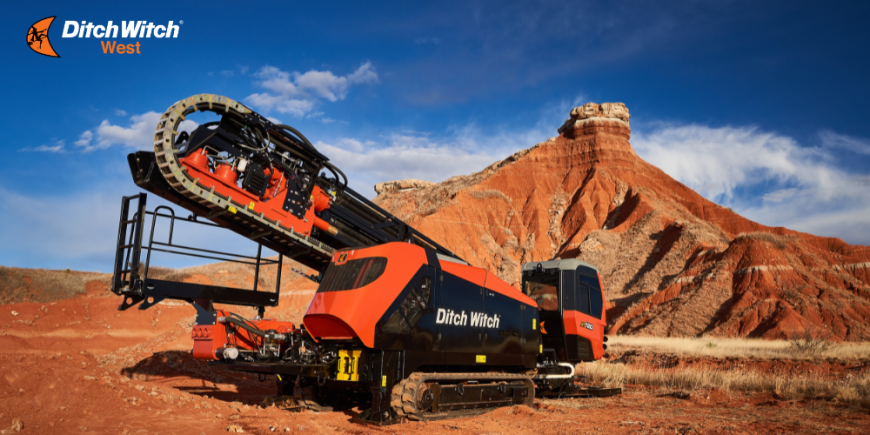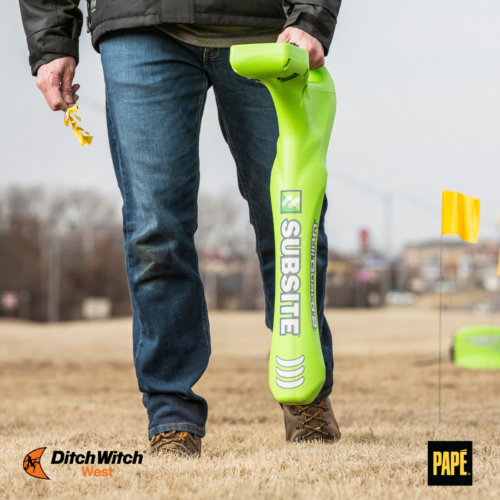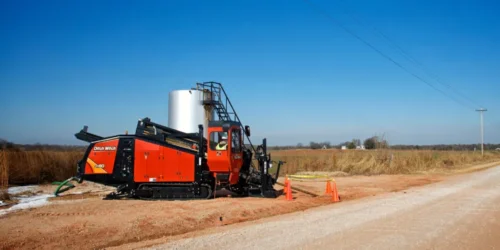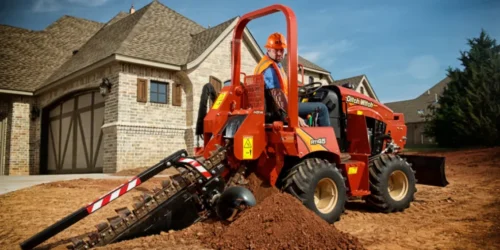When your crew is on the clock, the last thing you can afford is a drill that won’t start, a pump that won’t prime, or pipe that won’t thread. Preventive maintenance is the difference between a smooth, profitable bore and a costly day of idle labor. It protects operators, keeps schedules on track, and stretches every dollar you’ve invested in equipment and tooling.
At Ditch Witch West, our mission is to keep your drills working day after day, bore after bore. And the best time to set up that success is before the rush by bringing your rig in during the off-months for a thorough inspection, service, and pre-season readiness plan. Below, we outline why that timing matters, what an effective maintenance program includes, and how our team supports you across the West.
Why Preventive Maintenance Matters
Well-maintained HDD rigs perform better, are more productive, and maintain their value longer. Skipping intervals or “running it till it breaks” compounds small issues into failures that sideline jobs and blow up budgets. Industry guidance is clear: establish a maintenance regimen and stick to it to reduce breakdowns, protect your drill string, and improve jobsite ROI.
Beyond productivity, maintenance is a safety imperative. Properly serviced hydraulic, electrical, and fluid systems help prevent heat buildup, leaks, and unexpected component failure. Routine inspections catch wear on critical parts before they become hazardous. Planning and preparation before each bore also reduce risk and protect your pipe by respecting bend radius and ensuring a clean, well-mapped path.
Make the Off-Months Your Competitive Advantage
Weather slowdowns, holiday lulls, or municipal moratoriums often create a natural pause in your schedule. Use that pause to put your drills in the best shape for the busy season. Here’s why timing your service for the off-months deliver outsized value:
- Deeper Diagnostics without the Job Pressure: Off-season service gives technicians time to run full hydraulic pressure and flow tests, inspect gearboxes and undercarriage components, verify electrical systems and charging performance, and assess wear patterns on pipe, housings, and tooling.
- Parts Availability and Lead-Time Buffer: If inspection reveals a component that should be replaced, addressing it during the off-months beats the spring rush, minimizing wait times and avoiding mid-season delays.
- Plan Major Repairs on Your Terms: Schedule larger repairs or component rebuilds when crews are less active, so uptime is protected when demand spikes.
- Baseline and Documentation for the Year: We establish current-state measurements (pressures, flows, voltage, track wear, torque tests) and document them, so you have a benchmark to spot changes quickly during the season.
- Storage and Winterization Done Right: If a rig sits for weeks, we help you winterize correctly, maintain batteries, protect threads, and store pipe to prevent corrosion or set-in wear.
- Training Refresh for Operators: Off-months are ideal for quick refreshers on pre-shift checks, fluid management, and pipe discipline, keeping the whole team aligned on best practices before the first rod goes in.
What a Smart Maintenance Program Must Include
Daily Pre-Shift Checks
A consistent pre‑shift routine is the fastest way to catch small issues before they become big ones. Build this checklist into your morning startup:
- Walk-Around: Inspect frame, covers, and guarding. Look for any signs of leaks under the machine.
- Fluids: Verify engine oil, coolant, and hydraulic reservoir leads. Top off as needed.
- Hoses and Belts: Check for chafing, cracking, or looseness. Verify clamps and fittings are tight.
- Electrical: Confirm battery condition and connections. Verify lights, alarms, and E-stop functionality.
- Tracks and Undercarriage: Check track tension and look for damaged or missing rollers or lugs.
- Safety Systems: Confirm interlocks and safety devices function correctly.
- Pipe and Threads: Inspect for galling or damage. Clean and apply proper thread compound before use.
- Locating and Guidance Gear: Verify transmitter/receiver operation and perform any required calibrations.
- Functional Test: Briefly cycle thrust/pullback and rotation to check for odd vibrations, pressure spikes, or sluggish response.
Tip: Keep a simple pre-shift log at the machine. A 60-second record builds accountability and creates a paper trail that helps our techs diagnose issues more quickly if something changes mid-season.
Fluid System Care
Drilling fluid is the lifeblood of the bore. Clean fluid reduces heat and friction, extending the life of your pipe, housings, and tooling.
- Keep mixers, pumps, and filters clean.
- Mix fluid properly for soil conditions.
- Monitor viscosity and return flow so you’re not starving the string or overworking the pump.
Pipe and Tooling Discipline
A few minutes on the rack prevents galled threads, stuck joints, and broken strings that can halt a project:
- Respect recommended bend radius.
- Rotate your pipe to distribute wear.
- Apply proper thread compound.
- Clean connections meticulously.
Intervals You Can Count On
- Follow the manufacturer’s service schedule for filters, oils, and greasing, and document it.
- If you’re running hard rock or long shots with all-terrain systems, consider shorter intervals.
Operator Training
Even the best maintenance plan will fail if the team doesn’t recognize early warning signs:
- Pressure fluctuations.
- Odd vibrations.
- Sluggish thrust and/or pullback.
Equip operators to report issues immediately so small problems don’t turn into major costly repairs.
Off-Month Services at Ditch Witch West: What We Do, Step by Step
When you bring your Ditch Witch West during the off-season, our skilled technicians complete a comprehensive, drill-specific evaluation and service.
1. Full Machine Inspection and Baseline Testing
- Hydraulic pressure and flow checks, relief valve verification.
- Engine health review, including filters, coolant condition, and anomaly codes.
- Electrical system and battery load test.
- Inspection of harnesses and connectors.
2. Undercarriage and Drivetrain Assessment
- Track tension adjustment and roller/sprocket inspection.
- Carriage, rack-and-pinion, and slide wear checks.
- Alignment checks where applicable.
- Gearbox and bearing inspection for play, noise, and heat.
3. Mud System Cleaning and Evaluation
- Pump inspection (fluid ends, seals, and drive couplings).
- Mixer, tank, and filtration cleanout to eliminate set-up fines and debris.
- Pressure testing and verification to spec.
4. Pipe, Housing, and Connections
- Visual inspection for thread damage, galling, mushrooming, or bending.
- Cleaning, chasing threads as needed, and proper storage preparation.
- Recommendations on rotation strategy to even out wear.
5. Software and Calibration
- Controller and display updates where applicable.
- Verification of sensor inputs.
- Locate/guidance equipment checks and calibration support.
6. Preventive Replacements and Parts Planning
- Proactive replacement of high-wear filters, seals, and hoses based on inspection findings.
- Quoted recommendations for components approaching end-of-life so you can plan spend before the rush.
7. Winterization and Storage Setup (As Needed)
- Coolant protection verification, fuel conditioning guidance, battery maintenance plans, and corrosion prevention for threaded connections and pipe.
- Storage tips to minimize flat-spotting, corrosion, and electrical drain.
8. Pre-Season Start-Up Verification
- When you’re ready to roll, we perform a final start-up check: confirm pressures, flows, alarms, and functions.
- Re-inspect critical fasteners.
- Run a short test cycle.
All findings are documented so you have a clear readiness report and maintenance plan heading into peak work. If a larger repair is necessary now, we coordinate the schedule so it doesn’t cut into your production schedule.
Why Ditch Witch West Is Your Uptime Partner
Keeping your drill on the job is what we do. Ditch Witch West backs your fleet with 24/7 service and support, a deep inventory of genuine OEM parts and attachments, and skilled, factory-trained technicians who know your equipment inside and out. That combination is how we minimize downtime and maximize ROI for contractors across the West.
Service That Meets You Where You Are
With conveniently located dealerships throughout California, Oregon, Washington, Montana, Alaska, and Hawaii, you’re never far from expert support and fast parts pickup. And when you need help onsite, our teams mobilize quickly to keep your schedule on track.
Genuine Parts Always on Hand
From drill pipe and housings to filters and seals, we stock the parts you rely on, plus attachments and accessories that help you tailor the machine to the job. If you need guidance, our parts professionals will get you exactly what your rig and soil conditions demands.
Ready to Maximize Your Uptime?
Let’s build a maintenance plan around your goals, soil profiles, and crew schedule, and make the off-months work for you. Start by scheduling service with Ditch Witch West. We’ll set your rig up for a trouble-free season and support it with parts and technicians to keep it that way.
Bring your drill in now to beat the spring rush, catch wear early, and roll into your first bore with confidence.







